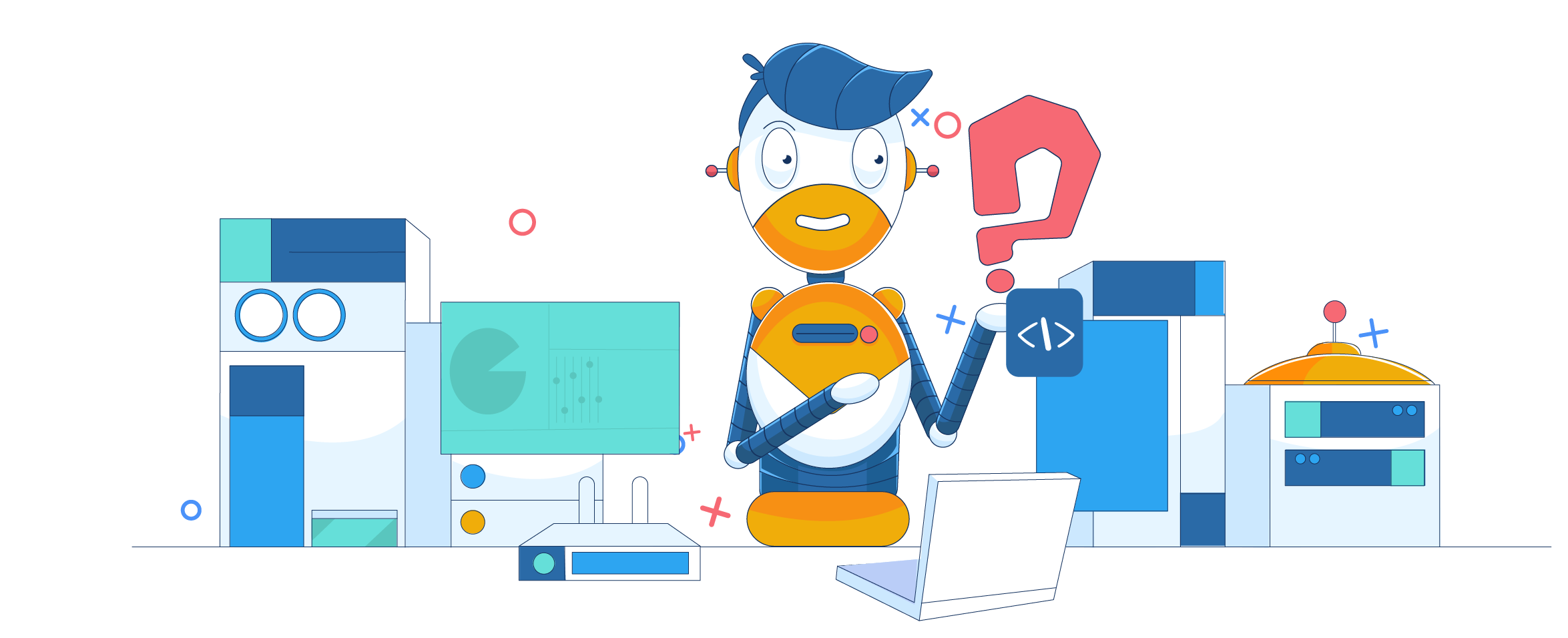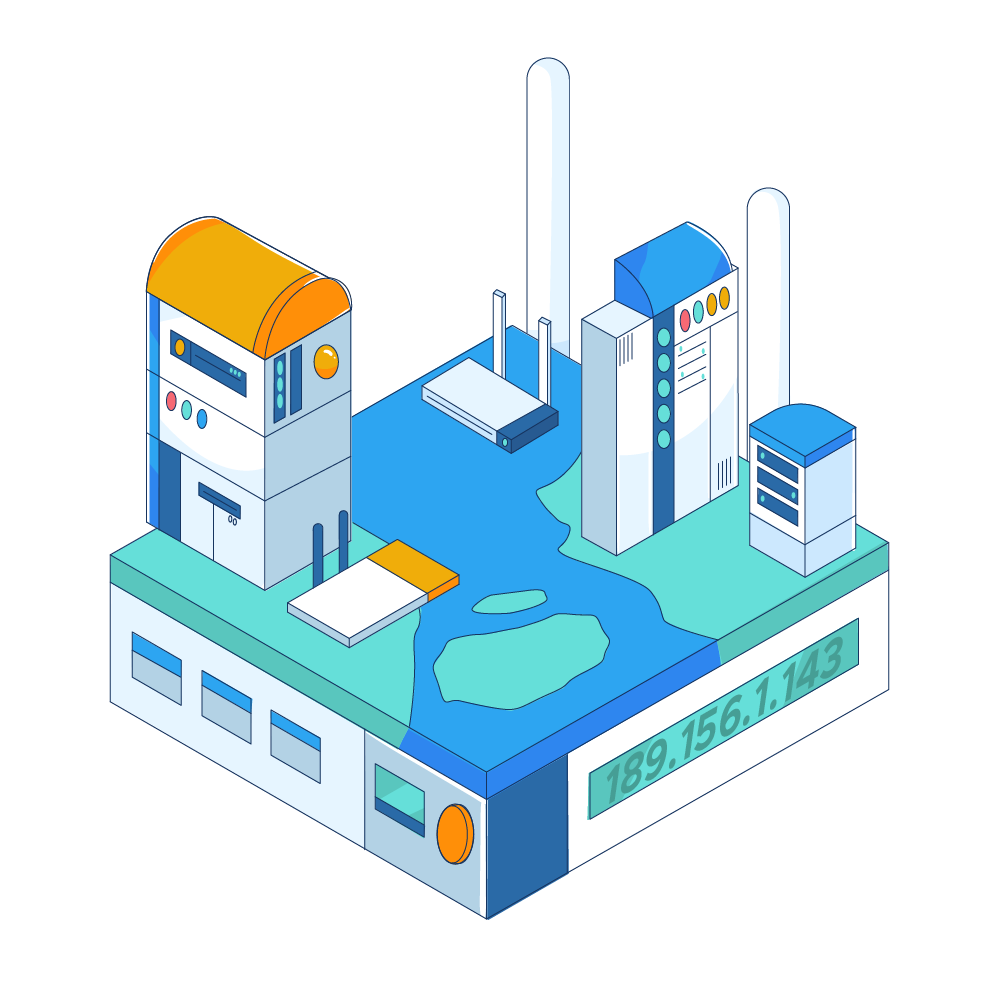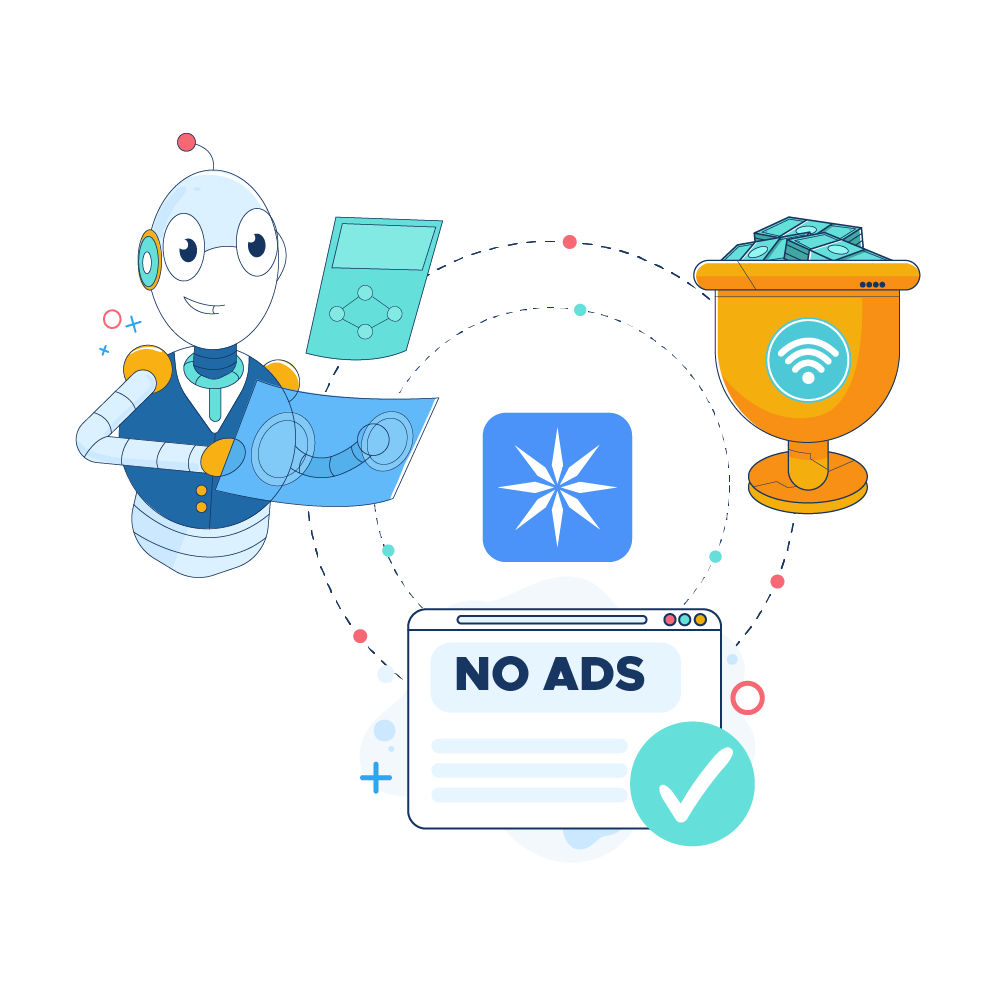ROTATING RESIDENTIAL PROXIES
Special Rotating Proxies
Rotating residential proxies with worldwide geo targeting optimized for high success rates.
Basic Rotating Proxies
Rotating residential proxies with random geo location.
Fast Rotating Proxies
Rotating residential proxies with worldwide geo targeting optimized for scraping and data gathering.
On Demand Proxies
Residential proxies with on demand rotation, geo targeting using user and password authentification.
The World of Proxies: Frequently Asked Questions

Most Internet users are already familiar with the idea of proxies and the fact that they are used by average people and companies alike for personal and business reasons.
But if a normal user takes advantage of a proxy server to hide the tracks of his online activities, companies are mostly interested to use proxies as a means of accessing content from the online environment that could benefit their commercial endeavors.
Since many enterprises are increasingly looking to integrate proxies for a multitude of reasons, from market analysis and sales intelligence to marketing campaigns, they begin to understand that the world of proxies is a bit more complex than they initially thought and they should know exactly what kind of proxies they need to be successful.
For this reason, we decided to pull together a list of Frequently Asked Questions about proxies so that companies - large and small - may be aware of what type of proxy servers they need to use in order to extract the right kind of information from the online space.
Frequently asked questions about proxies
What is the connection between proxies and IP addresses?
When approaching the topic of proxies we should start thinking first about IP addresses and the way they are used by various devices when connecting to the online space. The IP addresses are at the center of the proxy server industry as they include a variety of details that users may want to hide for privacy or business reasons.
What kind of information can an IP address reveal?
An IP address usually reveals where we connect from (country, city, even street) and what Internet Service Provider network we are using, offering enough details to outside parties about our online personas and our intentions.
How many types of IP addresses do we have in the proxy server industry?
Since we are focusing on the proxy server industry, we need to emphasize that the IP addresses available right now in the market for business purposes can most of the time come from Internet Service Providers (residential IPs), data centers from all over the world (data center IPs) and mobile networks (mobile residential IPs).
What are proxies?
Proxies can be considered as connecting doors between our devices and the online sites we want to access. A proxy allows a user to reach an online location via a different IP hiding the real IP address for privacy reasons. Using a proxy service, users can access online content from different countries to avoid online barriers and restrictions.
Are proxies used for personal or business reasons?
Though we can find normal users who take advantage of proxies for personal reasons, most of the time we’ll see companies displaying a real interest in proxy services for business reasons.
What are the most popular use cases of proxies for companies?
Generally, enterprises that want to run web scraping activities in the online space look to use the best types of proxies for obtaining the right type of data that can help them improve their business perspectives.
As for the most popular use cases, we can reveal that numerous companies consider proxy services essential for the following activities: data extraction, market analysis, sales intelligence, online testing, improving SEO, and e-commerce.
What are the most popular types of proxies for business purposes?
The most popular types of proxies for companies that need to extract information from the Internet are residential proxies that use IP addresses from Internet Service Providers and datacenter proxies that use virtual IP addresses from data centers. If the residential IP addresses are used by real users, the datacenter IP addresses are virtual IPs provided by data centers.
What are the pros and cons of using residential proxies?
As we have already mentioned, residential proxies use IP addresses from normal users who receive their IPs from the local Internet Service Providers in the area. Since these IP addresses belong to everyday users - and reveal a person’s country, city and ISP - they are preferred by many companies for data extraction projects.
So, the main advantage of using residential proxies resides in the fact that the user will not be easily blocked or restricted from accessing online locations when scraping web data. It goes without saying that the users who prefer residential proxies are most of the time companies that have to obtain reliable data for their businesses and cannot afford to fail.
As for the disadvantages of using residential proxies, there aren’t so many. However, we need to emphasize that since the user is relying on residential IP addresses that are used by normal people, the general speed of the connection is difficult to be guaranteed.
The online speed will always depend on the network and bandwidth provided by the Internet Service Provider and it’s a factor proxy server companies cannot control, so users should be aware that local conditions apply.
Nevertheless, when going for residential proxies, users can try to make sure they choose a proxy server provider that brings years of experience in the market and is recognized for a reliable set of proxy solutions.
What are the pros and cons of using datacenter proxies?
Datacenter proxies are more easily to be found since they’ve been around for a longer period of time and have been used by many enterprises for online scraping jobs over the years.
Datacenter proxies use IP addresses that are provided by data centers from all over the world. If we are to compare IPs from data centers with IPs from residential users, we can say that data center ones can be considered virtual IP addresses since they do not reveal the same amount of data about users as residential IPs.
So, what are the advantages of using datacenter proxies for companies?
First of all, we have to say that depending on the business profile and the online scraping jobs to be executed, datacenter proxies may be more than enough to get the job done as they are faster, cheaper, and more easily to be acquired than residential proxies. Since these virtual IPs come from data centers, the online data is no longer dependent on the user’s network or browsing preferences.
However, though all may seem great, datacenter IPs do come with a major drawback. Since the IPs from data centers have been used for a longer period of time by various people, web administrators started to place multiple restrictions on these types of IPs detecting and blocking them from accessing the targeted information.
So, many companies that were involved in online scraping activities for business purposes started to miss the data they needed. For this reason, residential proxies became increasingly popular and are preferred today by companies that run data extraction jobs where obtaining reliable information is key.
What are the main differences between residential and datacenter IP proxies?
Residential proxies use (residential) IP addresses from local home networks making online browsing activities look like natural connections for companies that want to obtain online content from different sites. They offer companies higher chances of obtaining the required web data.
Datacenter proxies use virtual IP addresses from data centers. Though they are faster than residential proxies, these IP addresses are more commonly detected and blocked by websites. They have been used in the proxy server market for a longer time than residential proxies and are still used successfully today for a great number of online scraping activities.
How do proxies help companies scrape online data?
Since proxy servers behave as connecting doorways between our devices and the online places we have to reach (hiding our real IP addresses in the process), they actually access the data we need and send it further to us. A proxy server acts as a middleman that collects the required information when we engage in data extraction projects on websites that could restrict our access.
What should a company look for when choosing a proxy?
Companies that want to use proxies should determine first what kind of content they need to obtain from the online space. And second, they should already have at least some limited experience in scraping sites to acknowledge how hard it is to obtain online data.
Only after having the necessary answers at hand, can a company be able to determine what types of proxies are required for the data extraction jobs. Though we have no problem recommending our clients the residential proxy solutions, there are many online scraping projects where datacenter proxies might prove to be more than enough.
For instance, you may have to collect data for market research or to improve your website’s SEO. In this case, datacenter proxies might be all you need as they still provide a fast and stable connection while coming at a lower price.
However, if you’re involved in business projects that demand reliable sales intelligence or want to have a price comparison analysis from your competition where accurate data is key, then you may take residential proxies into account.
Finally, besides the proxy solution, a company looking to target web data from the online space should try to find the best proxy server provider in the market that can offer not only the right products but the necessary support along the way.
What is the difference between a proxy service and a VPN?
When talking about privacy, many people tend to make a confusion between a proxy server and a VPN as they both work to hide a user’s browsing activities in the online space. However, proxies and VPNs are not the same things and there are some differences between them.
A proxy server’s main function is to hide a user’s IP address, especially when the user is engaged in a data extraction project. Since the IP address reveals many details about a user’s geographical location and ISP network, a targeted website’s administrator may be able to extrapolate the user’s identity. Therefore, a proxy server becomes a doorway that maintains your connection and preserves your private details while accessing the sites you want to reach.
A VPN, or a Virtual Private Network, may behave in a similar manner as a proxy server redirecting your online connection and hiding your private details, but a VPN is also able to encrypt your online traffic along the way. The advantage of using a VPN is that your entire online activity is encrypted and the Internet Service Provider cannot monitor your web activities.
What is important to remember is that VPNs and proxy servers are usually considered for different purposes. Normally, VPNs are used by professionals to access work-related online locations, while proxy servers are employed by companies that engage in web scraping projects and need a greater amount of data for their projects.
Is it legal to use proxies?
Users can take advantage of proxies that target public information in a legal manner.
Though we are generally focusing on proxy server solutions that are employed by companies involved in data extraction activities, proxies have different use cases and many people enjoy them for various purposes, from work-related activities to personal projects.
From a general perspective, as long as proxies are employed for obtaining public information, they are legal and safe to be used. (Of course, we are not talking here about less democratic countries that try to check their citizens’ actions, like China or North Korea.)
How should I choose a proxy server provider?
With so many proxy providers in the market, companies that are not familiar with the proxy space may have a hard time choosing the right service. Still, there are two major elements that should be considered by any business involved in web scraping jobs when looking for the best proxy company.
Reliable solutions: It is important to know that your proxy server solutions work on a 24/7 basis offering a high level of privacy for your IP address. At the same time, keeping your identity details protected while delivering stable scraping sessions is an important factor in choosing a proxy company.
Fast service: Companies that need to target content from online sources are surely interested in acquiring data at a reasonable speed. Though a company may choose to extract information via residential or datacenter proxies, the speed element is of the essence in both cases.
Residential proxies use IP addresses from real users that open many closed doors in the virtual environment, but the general speed will still depend on the ISP and the overall quality of the country’s average connection speed.
At the same time, with datacenter proxies in place, the speed factor remains a major element to be considered and users should make sure the proxy provider can deliver reliable IP addresses from data centers in countries recognized for the overall great quality of the Internet.
How is a proxy server provider different from Tor?
If we compare the Tor browser to a proxy server, we have to acknowledge that a proxy acts as a middleman between your browser and the Internet. The proxy server actually becomes your online identity, hiding your real IP address and offering you the necessary privacy.
Tor is a browser that protects your online browsing habits via multiple layers of encryption directing user traffic through a series of nodes in order to keep private details safe from outside parties. Since Tor is an open-source project, the browser relies on volunteers to maintain the network functionality.
In conclusion, though Tor may seem to offer higher levels of online security and privacy, the famous privacy browser does not provide the best speed. A proxy server may only replace your IP address with another one - without providing the high level of online security as a Tor browser - but it does work better for online scraping jobs where speed is of the essence.
This category's latest stories

4 Simple Reasons Businesses Love To Use Proxies
Businesses love proxies for many reasons. In this article, we focus on the most important benefits for SEO, social media, online sales, and pricing.

What are Datacenter Proxies and How They Can Help your Business
Do you want to find out how datacenter proxies can support your business development? Check out our article and find out how they can support business!

6 Myths About Proxy Server Solutions
Are you aware of all the myths that surround proxies? Let’s debunk the most popular myths about proxy server solutions. Check out our blog post!
Featured Articles

News
02.12.2024
Introducing Ice Payments on Shifter
Discover seamless crypto transactions with Ice payments on Shifter. Streamline your proxy service purchases and unlock new opportunities with Ice integration.

Residential Proxies
04.04.2023
8 Myths About Proxies. What You Should Know?
Are you aware of all the myths and stories surrounding proxies? Check our article and test your knowledge of proxies’ true limits in the online environment.

News
03.21.2023
Looking for an Alternative to Pi Network? Why ice Network is the Perfect Solution
Find more about the tremendous advantages of the ice Network and mining ice coins, as many are starting to take notice, ultimately choosing to leave Pi Network to have access to better, more rewarding opportunities.
Shifter's legacy
Shifter was founded in 2012, as one of the first residential proxy providers, since then it has become one of the leading proxy networks in the world and it's used by more than 25.000 clients including Fortune 500 Companies. Users can connect from anywhere to access local data without any restriction, while preserving a high degree of privacy and security.